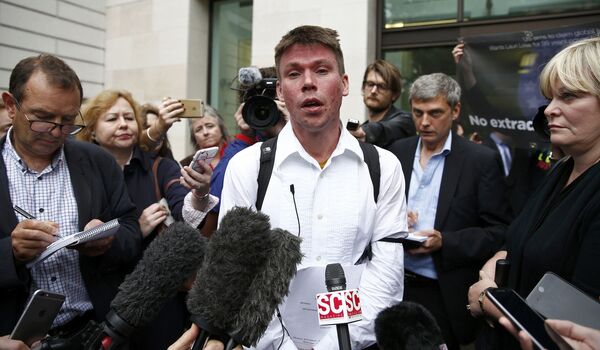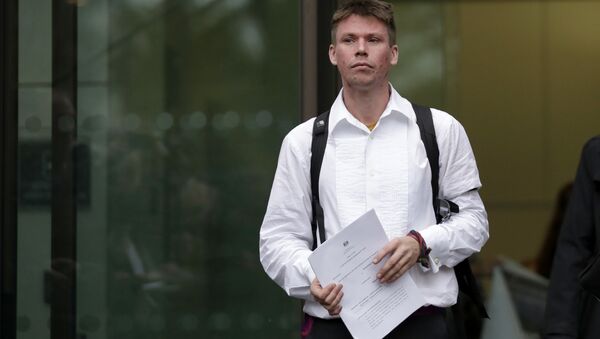Love's Twitter account, @LauriLoveX, was suspended without warning or elucidation from Twitter. Supporters soon took to the social network to voice their anger, and defend the embattled hacktivist.
Lauri Love, alleged criminal hacker who may be extradicted to the US, suspended from Twitter (h/t @mzbat) pic.twitter.com/gnemF4xPwZ
— Joseph Cox (@josephfcox) March 6, 2017
Political activist @LauriLoveX targeted by the government and now suspended by Twitter. Please reinstate his account! @support #FreeLauri
— #FreeLauri (@FreeLauriLove) March 6, 2017
Lauri Love is a computer scientist from Stradishall, UK. A dual UK-Finnish national, the autistic Lauri registered as a conscientious objector in Finland to avoid national service in 2009, before enrolling on a degree in Computer Science and Physics at Glasgow University.
He was arrested by UK police in October 25, 2013, the same day fellow hacktivist Jeremy Hammond received a ten-year sentence for cybercrime, on suspicion of participating in #OpLastResort, a group hack coordinated by Anonymous in the wake of the suicide of prolific coder Aaron Swartz.

Swartz had committed suicide in January of that year, following what his family and supporters claim was a campaign of relentless persecution by US authorities over allegations he had illegally published exclusive academic articles for mass consumption.
Under the operation, official US government websites, including the US Sentencing Commission's homepage, were hacked. Videos were placed on the pages airing grievances about the way Swartz had been treated, and concerns about the coercive use of the Computer Fraud and Abuse Act by US prosecutors.
Charges were eventually dropped due to lack of evidence, but Love was subsequently rearrested in July 2015 by Metropolitan Police officers, acting on a US extradition warrant.
Allegations include Love having targeted the computer networks of the US army, US Missile Defense Agency, Federal Reserve, Environmental Protection Agency and NASA.
In response, over 100 MPs signed a letter asking then-President Obama to drop the order.
It argued Love had a "a long history of serious mental health issues, depression and some episodes of psychosis," expressed fear that he could die if imprisoned in the US and argued it would more appropriate for Love to be tried in the UK.
"The UK has a proven track record of appropriately sentencing and rehabilitating individuals who have committed computer-hacking offences against the US," the letter stated.
Unfortunately for Love, Westminster Magistrates Court ruled against him, leaving an appeal his only hope of dodging extradition.
Love's case bears a striking resemblance to Gary McKinnon's, who was also accused of hacking US government computers and spent a decade fighting extradition on mental health grounds. In the end, his efforts were successful. If Love is unsuccessful, he will be the first British hacker extradited to the US.
Speaking to Sputnik in October 2016, Love said despite the the focus on sovereignty in Britain, following the Brexit vote, the country remained "subservient" to America, and he had little optimism the extradition order wouldn't be fulfilled — moreover, the prospect of a spell in US prison made him "fear for his life."
"Now we're in a situation even more dangerous than before. We're not even back to square one — it's worse than that. Our subservient relationship to America has caused us a lot of problems and we're still living in the shadow of the consequences of the war on terror in terms of destability," Mr. Love told Sputnik.
He reasoned that if somebody breaks the law, then they should be prosecuted under the laws of the country where they live and not the laws of a country they've never visited.
"In the US you can be put in solitary confinement in a suicide smock and another prisoner will watch you until you're not at acute risk of suicide. You'll then be chucked back into the general population and that's when people do kill themselves. For me it's about justice and whether its right someone should be put in a position where they fear for their life."
Love's fears off ill-treatment in the US prison system pending trial are arguably well-founded.
Hammond was imprisoned for 21 months before his trial began, and repeatedly denied bail, despite offering home confinement, electronic monitoring, and a complete cessation of computer access. His judge stated Hammond was more dangerous than a sex offender committing crimes online because such criminals don't "hide their identities" as he did.
.@LauriLoveX was suspended this morning, and no-one knows why! pic.twitter.com/RrJKtsEt8j
— ニヤは猫じゃない (@wolfniya) March 6, 2017
During his pre-trial confinement, Hammond was also denied access to his discovery evidence by the prison, logging only 11 hours of access to the laptop which contained the relevant files between 13 February 2013 and 10 April 2013, severely compromising his ability to defend himself properly.
Moreover, Hammond was, like Chelsea Manning, Barrett Brown and Andrew Auenheimer, subjected to solitary confinement during his sentence, despite the practice being condemned by the United Nations and major international human rights organizations as a form of psychological torture. Love could reasonably expect to be treated similarly.
It is as yet uncertain whether Love's Twitter ban is a precursor to extradition.
Elsewhere, Kim Dotcom, founder of now-defunct file-sharing website Megaupload, and three of his associates face extradition to the US. They could be jailed for 20 years or more each on piracy charges.





